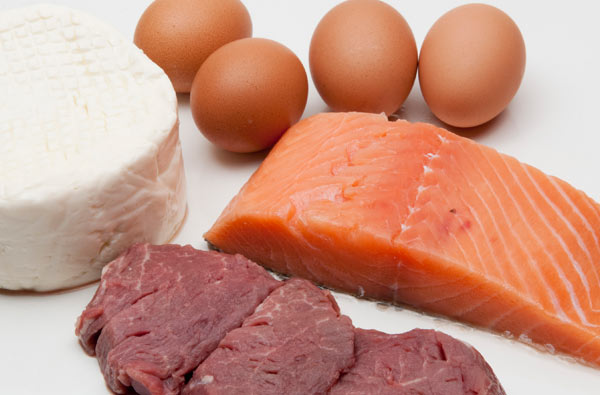
What does protein do for the body?
Protein is made up of amino acids, some of which your body can make (called “nonessential” amino acids), and some which you must obtain from food (called “essential” amino acids). Protein is the principal component of every cell in the body and is needed to build and repair tissues. It provides the building blocks for important hormones and digestive enzymes. Your body uses protein to carry oxygen in the blood and is needed for a healthy immune system. Protein is also important for blood sugar control and keeping you feeling fuller for longer periods of time. That’s why we recommend that every meal and snack contain some form of protein.
How much protein does the body need?
There’s a lot of conflicting information about how much protein your body needs. The Recommended Dietary Allowance (RDA) states that you need 0.8 grams of protein for every kilogram of body weight. So, a 145-pound person (65.9 kg) would need 52.7 grams of protein a day. It has been argued that this is the minimum to prevent deficiency, and nitrogen balance studies have shown that there is a higher need for athletes, regardless of their sport. The joint American College of Sports Medicine and Academy of Nutrition and Dietetics position statement calls for 1.2 to 1.7 g/kg for strength athletes and 1.2 to 1.4 g/kg for endurance athletes.
While the body has the capacity to store carbohydrate and fat, there is no such storage for protein, which is why it must be consumed daily. When too much protein is consumed, it is either used as an inefficient source of energy or converted to fat. Excessive protein consumption, whether from food sources or by liquid or powder supplements, may cause dehydration, as well as negatively impact the kidneys and bones. When protein is consumed in the range of 1.4 to 2.0 g/kg, there does not appear to be any negative effect on the kidneys and bones.
Some people don’t want to do the math and calculate their protein needs based on body weight. Instead, you can calculate your protein needs based on a percentage of your total calorie intake. We recommend protein to comprise 15 to 35 percent of your total calorie intake. That’s a pretty big range and there are a few factors that determine your requirements, including:
1. Activity level (sedentary, athlete, recreational athlete, etc.)
2. Weight
3. Goals (maintain muscle mass, build muscle mass, lose weight, etc.)
4. Age
Special Considerations
Children and Teens
For most adults, protein plays a role in performance, recovery and injury prevention. For children and teens, a healthy, balanced diet is important for the same reasons, as well as to provide for proper growth. Most children don’t prefer protein-rich foods, opting instead for carbohydrates in the form of cereal, chips, bread and pasta. It’s important that adults (parents and caregivers) provide a wide array of protein foods and encourage their inclusion at every meal and snack. Although protein bars and powders are popular with young athletes, children and teens should be encouraged to reach for real food, including yogurt, cheese, nuts, nut butters, turkey and soybeans.
Vegetarians
According to the Institute of Medicine, the protein needs of vegetarian athletes are no different than that of an omnivore, provided they consume a varied diet that includes complementary proteins. Because most plant-based foods are incomplete proteins (they are missing one essential amino acid), it is recommended that vegetarians consume a blend of protein-rich foods during the course of the day to provide all the essential amino acids. Some researchers and professional groups put the protein needs of vegetarian and vegan athletes higher due to the digestibility of plant-based proteins. Vegan athletes, whose primary sources of protein are nuts, seeds, soy and legumes, should aim for an additional 12 grams of protein each day.
Best Types of Protein
As mentioned earlier, protein is made up of amino acids, some of which are considered “essential” because our bodies cannot make them and must be obtained from food. However, that doesn’t mean that all of our protein choices must come from foods that have all of the essential amino acids. Instead, be aware of what foods contain protein and choose a variety of them each day.
Animal–derived Proteins
Animal protein foods include fish, chicken, turkey, meat (from cow, lamb, pig or goat), milk, yogurt, cheese and eggs. These are considered high-quality proteins because they contain all of the essential amino acids.
Plant-based Proteins
Most plant-based proteins are missing at least one essential amino acid and are therefore considered “incomplete” proteins. Exceptions include soy, quinoa, amaranth and buckwheat, which contain all of the essential amino acids. Other plant-based proteins, including vegetables, legumes, grains, nuts and seeds, are incomplete but when eaten during the same day (i.e., beans and rice) all the essential amino acids are available to the body.
Protein-rich Meals
Every meal should contain a protein, a healthy carb, vegetables and a healthy fat. Here are some of our favorite combinations that are easy to prepare and delicious!
-2/3 cup cooked black beans served over 1/2 cup cooked quinoa and topped with salsa and guacamole
-4 to 5 oz. wild Alaskan salmon, sautéed asparagus and wild rice, topped with slivered almonds
-2 poached eggs served on top of 2 slices whole-grain bread and 1/2 smashed avocado
-8 oz. plain Greek yogurt mixed with 1/2 cup berries, 1 Tbsp. each of chia, hemp and ground flax seeds
-1 banana spread with 2 Tbsp. all-natural almond butter and topped with 1 Tbsp. chia seeds
-4 turkey meatballs served over whole-grain pasta or spaghetti squash with marinara sauce and parmesan cheese


